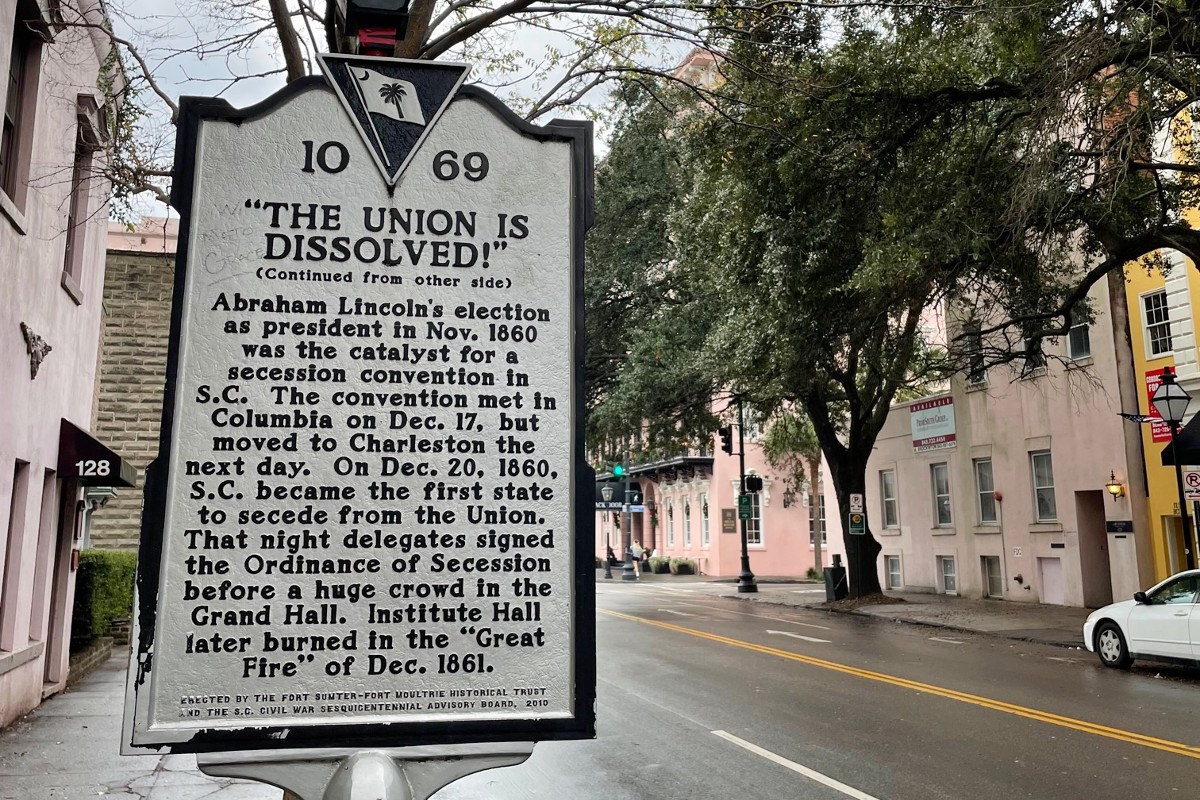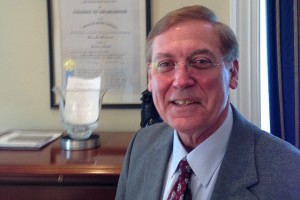
By Andy Brack | first published in the Charleston City Paper | The College of Charleston (CofC) will unveil a portrait of former President Glenn McConnell, a past lieutenant governor with a passion for the Lost Cause of the Confederacy, in a ceremony to be held on the 162nd anniversary of South Carolina’s secession from the union.
Another observed most people probably didn’t realize the unveiling was scheduled on a date tied to the Confederacy.
“Half of our students are from out of state. I don’t think they would recognize it unless it were pointed out to them.”
The portrait of McConnell, who served as the college’s president from 2014 to 2018, will be unveiled in a private ceremony at 4 p.m. Dec. 20 at the Sottile Theatre, the university confirmed. McConnell, who was one of the state’s most powerful senators before becoming lieutenant governor, is expected to attend.
“It is not a public event,” CofC spokesman Mike Robertson said. “Invitees include college officials, the Lowcountry legislative delegation and individuals who contributed private funds to pay for the portrait.”
As of Thursdday morning, there are no plans to change the time of the ceremony, Robertson said.
“This date was selected based on the availability of invitees and the academic calendar.”
Tone deaf or Yankees in charge?
McConnell, a West Ashley resident, is an attorney who once owned a Confederate memorabilia store during more than three decades in the state Senate.
Robertson had no comment when asked twice about whether the college was being “tone deaf” for holding the ceremony for McConnell on the Dec. 20 secession anniversary.
But one downtown business woman reacted, “Maybe the explanation is Yankees are in charge because, of course, they wouldn’t do this if they really understood.”
In 2010, McConnell, then a state senator, was broadly criticized for wearing the uniform of a Confederate general to a Republican event in Charleston. A widely-circulated photo showed him with two Black cultural reenactors. At the time, some criticized McConnell for being racially insensitive, but McConnell said the photo illustrated how far the state had come.
Chris Lamb, a former CofC journalism professor who now chairs the journalism and public relations department at Indiana University Indianapolis, was flabbergasted when told about the Dec. 20 ceremony.
“Oh, my gosh. That’s nuts,” he immediately reacted. Later he added, “President [Andrew] Hsu and the university have done an admirable job of addressing and atoning for the college’s racist history. But this is nuts.”
McConnell’s career of political leadership

McConnell was elected as a Republican to the state Senate in 1980 to represent a district that generally centered on West Ashley and North Charleston. Through the years while in the minority, he became a master at the Senate rules to move or thwart legislation. Through the seniority system, he became chair of the powerful Senate Judiciary Committee and had a hand in many of the key issues impacting the state for two decades.
A longtime proponent of the honor of Southerners who fought in the Confederacy, McConnell was key in the state’s effort to help to raise the H.L. Hunley, the Confederate submarine that was the first to sink a ship in battle. The Hunley, which sank in South Carolina waters during the war, was located in 1995 and raised from the sea floor in 2000. Today, it’s conserved in the old Navy Yard in North Charleston, where you can visit on weekends or daily as part of a group..
McConnell also was a key player in removing the Confederate flag off of the Statehouse dome in 2000 and putting it where some said was a more prominent place — on the Statehouse grounds. He later supported removal of the flag from the grounds following the murder of Sen. Clementa Pinckney at the Emanuel AME Church shooting in 2015.
McConnell served as Senate president pro tempore from 2001, when Republicans took over Senate control, until 2012. At that time, he became lieutenant governor, ascending according to constitutional rules after the resignation of Ken Ard from the state’s number-two executive branch job.
McConnell heads to College of Charleston
In 2014, McConnell became president of the College of Charleston. He was the first College of Charleston graduate to become its president. At the time, the City Paper reported:
“That decision has sparked protests, sit-ins, and petitions from students and faculty, who decry McConnell’s lack of academic experience and his history of defending the Confederate flag’s presence on Statehouse grounds. The student Senate passed a vote of no confidence in the Board of Trustees this week because of the Board’s decision to pick McConnell over two experienced academic administrators.”
Soon after taking over at the college, McConnell said in an interview that his critics didn’t really know him. Reflecting on the 2000 controversy around the Confederate flag, he told the City Paper:
“That was a very acrimonious time. The mainstream on both sides wanted to settle it. We took four flags down: the one on the dome, the one over each podium, the one in the hall, and then we put a soldier’s flag and a soldier’s monument. Those of us on both sides of that question, we got harshly criticized for that compromise, but the mainstream of South Carolina was happy with it. And I’m not going to go back and open old wounds and animosities over this. We settled it, we moved forward, and we thought we did so in a great thing.”
After a year at the college’s helm, now-sister publication Statehouse Report published a column in which McConnell said he was starting to enjoy being CofC president – and particularly working to make the campus more diverse:
“McConnell envisioned a future campus that looked more like the state of South Carolina, a third of which is comprised of non-white minorities,” the column said. “The college today [2015] has a 15%minority population, but only about 6%of the student body is African American. Applications from Black students are up about 15% this year, a trend McConnell said he wanted to see continue. In fact, he said the college is planning to launch a pilot program in seven area counties to automatically admit anyone who graduates in the top 10% of his or her high school class.”
- Have a comment? Send to: feedback@statehousereport.com.
















 We Can Do Better, South Carolina!
We Can Do Better, South Carolina!